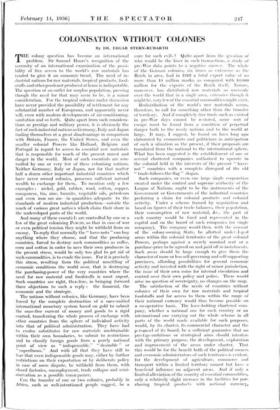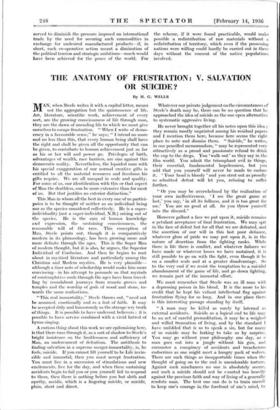COLONISATION WITHOUT COLONIES
By DR. EDGAR STERN-RITBARTH
THE colony question has become an international problem. Sir Samuel Hoare's recognition of the necessity of an international examination of the possi- bility of free access to the world's raw materials has tended to give it an economic trend. The need of in- dustrial nations for raw materials, tropical products, food- stuffs and other goods not produced at home is indisputable. The question of an outlet for surplus population, pressing though the need for that may seem to be, is p. minor consideration. For the tropical colonies under discussion have never provided the possibility of settlement for any substantial number of Europeans, and apparently never will, even with modern developments of air-conditioning, sanitation and so forth. Quite apart from such considera- tions as prestige and military power, it is obviously the fact of such industrial nations as Germany, Italy and Japan finding themselves at a great disadvantage in comparison with Britain, France, the United States, and even the smaller colonial Powers like Holland, Belgium and Portugal in regard to access to essential raw materials that is responsible for much of the present unrest and danger in the world. Most of such essentials arc con- trolled by one or very few of these colonising nations. Neither Germany, Italy or Japan, nor for that matter half a dozen other important industrial countries which have never owned colonies, possesses sufficient natural wealth to exchange for them. To mention only a few examples : nickel, gold, rubber, wool, cotton, copper, manganese, tin, zinc, bauxite, vegetable oils, petroleum and even iron ore are—in quantities adequate to the standards of modern industrial production—outside the reach of various great nations which claim their share in the undeveloped parts of the world.
And many of these essentinli are controlled 'by one or a few of the great colonising Powers; so that in case of war or even Political tension they might be withheld from an enemy. To reply that normally the " have-nots " can buy anything where they choose, and that the producing countries, forced to destroy such commodities as coffee, corn and cotton in order to save their own producers in the present stress, would be only too glad to get rid of such commodities, is to evade the issue. For it is precisely this stress, resulting from the political unsettling of economic conditions the world over, that is destroying the purchasing-power of the very countries where the need for raw material and foodstuffs is most urgent. Such countries are right, therefore, in bringing forward three objections to such a reply : the financial, the economic and the strategic.
The nations without colonies, like Germany, have been forced by the complete destruction of a once-unified international monetary system based on gold to submit. the once-free current of money and goods to a rigid control, transferring the whole process of exchange with other countries from the sphere of individual activity into that of political administration. They have had to evolve substitutes for raw materials unobtainable within their own boundaries, to submit to restrictions and to classify foreign goods from a purely national point of view as " indispensable," " desirable " or " superfluous." And with all that they have still to fear that even indispensable goods may, either by further restrictions on their exportation or by deliberate policy in case of some dispute, be withheld from them, with closed factories, unemployment, trade collapse and semi- starvation as a possible consequence.
Can the transfer of one or two . colonies, probably in Africa, such as well-intentioned people Suggest, be a cure for such evils ? Quito_ apart from the vestion of who would be the loser in such transactions, a study of pre-War data points to a negative answer. The whole of the German colonies, six times as extensive as the Reich in area, had in 1913 a total export value of no more than 18 million marks, as compared with 10,000 million for the exports of the Reich itself. Nature, moreover, has distributed raw materials so unevenly over the world that in a single area, extensive though it might be, very few of the essential commodities might exist.
Redistribution of the world's raw materials seems, therefore, to call for something other than the transfer of territory. And if completely free trade such as existed in pre-War days cannot be restored, sonic sort of escape must be found from a condition of perpetual danger both to the needy nations and to the world at large. It may, I suggest, be found on lines long ago elaborated by economists and politicians in anticipation of such a situation as the present, if their proposals are translated from the national to the international sphere. What has been suggested is the establishment of one or several chartered companies authorised to operate in the colonial field in the interests of the present " have " countries with a complete disregard of the old " trade-follows-the-flag " slogan.
. Such companies, or even one large single colporation created under the control and supreme authority of the League of Nations, ought to be the instruments of the Government or Governments of the industrial countries preferring a claim for colonial products and colonial activity. Under a scheme framed by negotiation and based on figures of their trade balances, their population, their consumption of raw material, &e., the part of each country would be fixed and represented in the capital and on the board of such companies (or single company). The company would then, with the consent of the colony-owning State, be allotted undev. 1 Ted areas within the colonial territories of the great. colonial Powers, perhaps against a merely nominal rent or a purchase-price to be agreed on and paid off in instalments. Such areas should be large enough to give them the character of more or less self-governing and self-supporting .provinces, affording possibilities for general economic activity and invested with the right of minor jurisdiction, the issue of their own coins for internal circulation and control over their own policy and police. There would arise no question of sovereignty, no changes on the map.
The satisfaction of the needs of countries without colonies of their own for raw materials and tropical foodstuffs and for access to them within the range of their national currency would thus become possible on a co-operative basis. The lease-holding chartered com- pany, whether a national one for each country or an international one carrying out the whole scheme in all parts of the world made available for such purposes, would, by its charter, its commercial character and the personnel of its board, be a sufficient guarantee that no prestige-ambitions or strategical aims should interfere with the primary purpose, the development, exploration and improvement of the areas under charter. That this would be for the benefit both of the political owners and economic administrators of such territories is evident, for the development of agriculture, commerce and transport within a limited territory cannot but have a beneficial influence on adjacent areas. And if only a limited alleviation of the scarcity of essential commodities, only a relatively slight increase in the facilities for pur- chasing tropical productS with national currency, served to diminish the pressure imposed on international trade by the need for securing such commodities in exchange for undesired manufactured products—if, in short, such co-operative action meant a diminution of the political tension and strategic ambitions—much would have been achieved for the peace of the world. For the scheme, if it were found practicable, would make possible a redistribution of raw materials without a redistribution of territory, which even if the possessing nations were willing could hardly be carried out in these days without the consent of the native populations involved.















































 Previous page
Previous page